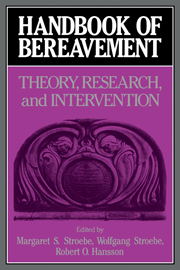Book contents
- Frontmatter
- Contents
- Contributors
- Preface
- Part I Introduction
- Part II The phenomenology and measurement of grief
- Part III Current theories of grief, mourning, and bereavement
- 5 Grief as an emotion and as a disease: A social-constructionist perspective
- 6 Bereavement as a psychosocial transition: Processes of adaptation to change
- 7 Grief: The social context of private feelings
- 8 Bereavement from the perspective of cognitive-experiential self-theory
- Part IV Physiological changes following bereavement
- Part V The psychological, social, and health impacts of conjugal bereavement
- Part VI Grief reactions to different types of loss
- Part VII Coping, counseling, and therapy
- Part VIII Conclusions
- References
- Author index
- Subject Index
8 - Bereavement from the perspective of cognitive-experiential self-theory
Published online by Cambridge University Press: 04 May 2010
- Frontmatter
- Contents
- Contributors
- Preface
- Part I Introduction
- Part II The phenomenology and measurement of grief
- Part III Current theories of grief, mourning, and bereavement
- 5 Grief as an emotion and as a disease: A social-constructionist perspective
- 6 Bereavement as a psychosocial transition: Processes of adaptation to change
- 7 Grief: The social context of private feelings
- 8 Bereavement from the perspective of cognitive-experiential self-theory
- Part IV Physiological changes following bereavement
- Part V The psychological, social, and health impacts of conjugal bereavement
- Part VI Grief reactions to different types of loss
- Part VII Coping, counseling, and therapy
- Part VIII Conclusions
- References
- Author index
- Subject Index
Summary
Cognitive-experiential self-theory (CEST) is a broad, integrative theory of personality that is compatible with major aspects of a wide variety of other theories, including classical and neopsychoanalytic theory, Jungian psychology, Adlerian psychology, reinforcement theory, existentialism, phenomenology, and modern cognitive psychology. Unlike other cognitive theories, it assumes the existence of not one but three conceptual systems, each operating by its own rules of inference, and each capable of influencing the others. It also differs from other cognitive theories in assuming that the systems are not simply a collection of discrete cognitions or even of isolated networks of cognitions, but function as organized wholes.
CEST shares with psychoanalysis an emphasis on the importance of the unconscious determination of human thought and behavior. However, without denying the importance of the Freudian unconscious for certain kinds of behavior, it introduces another level of unconscious processing of information that it considers to have a far more general influence on everyday thought and behavior. Because this other level of the unconscious is more accessible to consciousness than the Freudian unconscious, it is useful to refer to it as preconscious. Whether one wishes to understand individual personality or the more general effects of significant life events, such as bereavement, on people, it is necessary to understand how this system operates, for it is this system, not the rational system, or the one that operates at a deeper unconscious level, that primarily determines people's cognitive, emotional, and behavioral reactions.
- Type
- Chapter
- Information
- Handbook of BereavementTheory, Research, and Intervention, pp. 112 - 126Publisher: Cambridge University PressPrint publication year: 1993
- 10
- Cited by



